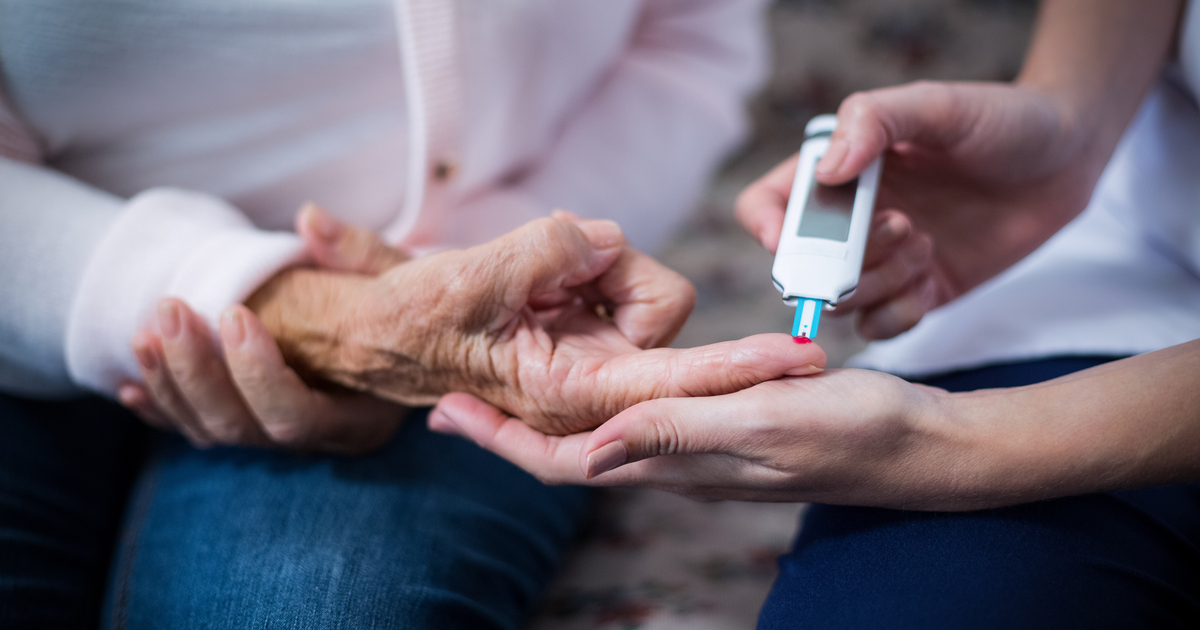According to the Centers for Disease Control and Prevention (CDC), roughly six million Americans aged 65-and-older have diabetes, with another 23 million seniors classified as being prediabetic. Unfortunately, many seniors with diabetes don’t even realize they have it. But left untreated, diabetes can cause serious health problems affecting the kidneys, heart, brain, eyes and feet. If you’re caring for an aging in place loved one, knowing the signs and symptoms of diabetes in elderly adults could help them live a longer and more productive life.
What Causes Diabetes?
Diabetes is a chronic metabolic disorder that interferes with how the body uses glucose (sugar) for growth, repair and energy. That process is regulated by a hormone called insulin that’s produced by the pancreas. When performing optimally, the pancreas releases just the right amount of insulin to facilitate the transport of glucose from the blood into the body’s cells.
But the pancreas in a diabetic person’s body produces either too much or too little insulin. As a result, glucose builds up in the blood and is excreted in the urine. The body’s cells are then deprived of their main source of fuel even when there’s plenty of glucose available.
What Types of Diabetes are There?
There are 2 chronic types of diabetes:
Type 1
This rarer form of diabetes occurs when the body’s own immune system starts targeting the insulin-producing cells in the pancreas. The resulting damage causes the pancreas to release little or no insulin, which is why type 1 diabetics must take insulin daily to survive.
Type 2
Most diabetics are type 2, elderly and/or overweight. In type 2 diabetics, the pancreas produces plenty of glucose, but for some reason it’s not used efficiently- a condition known as insulin resistance. As blood sugar levels rise, a client usually experiences symptoms. However, some type 2 diabetics remain asymptomatic and don’t realize they have it until much later.
What are the Signs of Diabetes?
If you suspect that a senior has diabetes, look for these signs and symptoms:
Type 1
- Excessive thirst and hunger
- Frequent urination
- Unexplained weight loss
- Fatigue
Type 2
- Any of the above symptoms
- Wounds that never heal or are slow to heal
- Confusion
- Blurred vision
- Depression
- Numbness or tingling in the feet or hands
Someone with uncontrolled diabetes is at high risk for heart disease and stroke, kidney damage, vision and hearing loss, poor blood circulation, foot problems and other health issues. If that person is an aging in place senior, their freedom and independence can quickly be placed at risk. If your loved one is experiencing one of more of these signs, have them examined by a doctor who can then order blood and urine tests.
Caring for a Senior with Diabetes
As a caregiver, you can help a senior manage their disease through:
Diet. Get a copy of the “Create Your Plate” diet from the American Diabetes Association and help them prepare nutritious meals based on those ADA guidelines.
Medication reminders. Whether it’s insulin for type 1 or oral medications that otherwise control blood glucose levels, keeping your loved one medication-compliant is important.
Exercise. Exercising 3 to 5 times a week helps normalize glucose levels and shed excess pounds, so encourage your senior to do so.
Glucose monitoring. Turn daily glucose checks into a contest and reward your loved one for keeping their sugar under control by taking them to the park or for a manicure.
Lifestyle changes. Smoking, eating sugary foods, and drinking alcohol and soda are harmful for someone with diabetes. Encourage your loved one to kick those bad habits to the curb.
Family Trusted Home Care for Seniors with Diabetes
Helping an elderly loved one manage their diabetes can be challenging, especially when you live far away. When you need a hand with senior care in Villanova or the surrounding areas, contact LightSpring Home Care. We are a family owned and operated agency with highly trained caregivers who know how to help aging in place seniors keep their glucose levels under control so they can continue living safely and comfortably right where they want to be.
In addition to diabetes management, our carefully screened aides can also provide in-home duties like homemaking, companionship, personal care assistance, medication reminders and escorted transportation. And, all our reliable services can be conveniently personalized into an affordable package when and where you need them! To learn more about LightSpring Home Care, or to schedule a FREE, in-home care consultation for a special senior in your life, please call or visit us online today.




